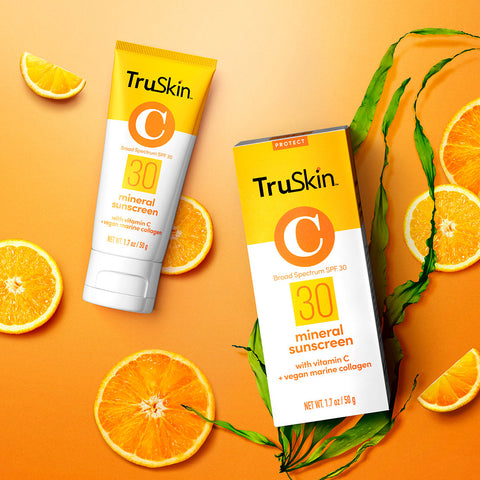
7 Healthy Aging Ingredients That Play Nicely With Sensitive Skin
Calling anyone over the age of 30 with sensitive skin. You need to read this.
Mildly sensitive skin isn’t the worst thing in the world. But it can be a real pain as you get older and want to introduce some potent skincare ingredients to your routine. Because wrinkles don’t take care of themselves. Neither do dark spots. Or sagging skin, for that matter. They need help from effective skincare formulations that ward off environmental pollution, boost collagen production, care for your barrier function, hydrate, brighten and basically do everything they can to help counteract the visible signs of skin aging.
Thankfully, these awesome ingredients are tried and trusted to take care of business – without irritating your precious skin.
1. Bakuchiol
Bakuchiol is basically nature’s answer to retinol which, as a skin buff, we’re sure you know a lot about. To recap, retinol is every derm’s dream ingredient. With decades of research under its belt it’s been proven to enhance collagen synthesis and encourage healthy skin turnover. That being said, retinol is a potent little beast and not for everyone – often causing all sorts of irritation if it’s not treated with the respect it deserves.
This is why bakuchiol is such a winner. Extracted from the seeds and leaves of the babchi plant, its anti-inflammatory properties have been used for centuries in Chinese and Ayurvedic medicine to treat the skin. More recent clinical studies have shown that, when applied regularly bakuchiol can also improve the surface of the skin by stimulating collagen synthesis and accelerating cellular turnover. Yes, just like retinol. And all without the irritating side effects.
You gotta try it. And we can help out with that because we have an entire range of healthy aging products dedicated to the wonder of bakuchiol. Check out our Longevity range, right here.
2. Ceramides
When it comes to caring for and fortifying your skin’s important barrier function, very few ingredients beat ceramides. Ceramides are important lipids that are found in abundance in your skin’s structure. There are many different types but each one plays a major role in the efficiency of your barrier function by binding the cells together while providing strength and stability, and preventing moisture loss.
Of course, like most of the good stuff in your skin, levels of ceramides drop dramatically as you age which can upset your barrier function and cause things like dryness, redness and dehydration. But if you stack them into your skincare routine you help to combat all this, therefore allowing your barrier function to do its job properly.
Interested? Then try our Collagen range which is jam-packed with ceramides as well as vegan collagen peptides and antioxidant-rich superfruits. We call that an absolute dream team for battling premature aging.
3. Hyaluronic Acid
Hyaluronic acid is no stranger to sensitive skin. And rightly so. As one of the most well tolerated ingredients in skincare, hyaluronic acid is another natural substance found in the human body – and that’s why your risks of developing irritation after application are so low.
We know you’re probably aware of hyaluronic acid and its genius way of hydrating your skin so we won’t bang on about it too much – although if you are interested in the full deets, head here. Instead, all we’ll say is this. One of the biggest issues with irritation and sensitive skin is dehydration. Hyaluronic acid draws moisture in to the top layers of your skin like a veritable water magnet. You don’t need to be a rocket scientist to get why the latter is so good for the former.
We recommend our Hyaluronic Acid Facial Serum which also contains vitamins C and E for extra brightening, soothing powers.
4. Niacinamide
A compromised barrier function is a one-way ticket to sensitive skin, so if you want to strengthen your skin and cut down on irritation you have to give it all the love. And one way to do this? By incorporating niacinamide into your daily routine.
A form of vitamin B3 and a very effective antioxidant, niacinamide is a whizz at rebuilding ceramides and lipids at a surface level, thus helping to moisturize and rebalance your skin while reducing excess sebum that can result in enlarged pores, breakouts and facial redness. It’s really great at supporting your skin’s barrier function and significantly reducing inflammation, but the best thing? It’s super gentle on your skin – you can even use it around your eyes. Many eczema or rosacea sufferers that can’t bear to put active ingredients on their skin also find that niacinamide is a god send.
It’s not for everyone (heck, what is?) but it’s worth a go if you’re looking to up your antioxidant protection and help ward off free radical damage. And who doesn’t want to do that?
Try our Niacinamide (B3) Facial Serum each morning before moisturizing.
5. Oat Milk
Most sensitive skin types are plagued with dry, dehydrated skin – they just seem to go hand in hand. Dry skin lacks sebum to keep itself moisturized and protected, you see, and this is a killer on the barrier function, causing it to lose moisture quicker than a leaky faucet.
One of the best ways to reduce irritation before you even get to your serum and moisturizing routine is to take a look at your cleansing game. Of course, there are many ingredients to avoid like harsh sulfates and synthetic fragrance, but one we do recommend is oat milk.
Like colloidal oatmeal which is a regular on the skincare ingredients scene, oat milk has similarly amazing benefits for dry, irritated skin. It’s made from oats and water only and has benefits as long as your arm. Think potent antioxidant powers to ward off premature aging; hydrating effects to reduce irritation and dehydration, and incredible anti-inflammatory properties to calm redness and, well, reduce any forms of inflammation. Like niacinamide, oat milk has also gained many fans with skin conditions like eczema and rosacea. We take that as gospel.
Give our Soothing Cleansing Milk a go which also contains rice milk to help even out your skin tone and give your complexion plenty of much-needed moisturization.
6. Sodium Ascorbyl Phosphate
Sure, you’ve heard of vitamin C, but what about its gentler, far superior (IOHO!) cousin, sodium ascorbyl phosphate?
Known to its buddies as SAP, sodium ascorbyl phosphate is a salt form of pure ascorbic acid which means it has a sodium and a phosphate molecule attached to it. So what? Well, this makes it more stable when you apply it topically, allowing it to stay potent for way longer than the pure stuff. It also means that your skin needs to convert it back into ascorbic acid after you apply it in order to gain any benefits from it. That might sound kind of laborious, but in actual fact it’s a great way to reap the benefits of ascorbic acid with fewer of the side effects often associated with this skincare giant.
For your fill of everything SAP has to offer (brightening, free radical damage and collagen boosting to name just a few of its benefits), we have a whole array of fantastic vitamin C products including exfoliants, cleansers, serums and moisturizers. We’re specifically all over the Vitamin C Deep Hydration Night Cream right now. Skincare while we sleep? So down with that.
7. Zinc Oxide
Applying sunscreen to sensitive skin can be a real headache if you choose the wrong kind of product. So don’t. But don’t simply ‘not bother’ either. Sunscreen is the single most important product for minimizing the signs of premature aging – by a country mile! So make sure you apply it every day, but stick with a formula that uses zinc oxide as its sun protection.
Zinc oxide is a mineral sunscreen and one of the gentlest, least irritating sunscreens available. Unlike chemical sunscreens like avobenzone, it’s far less likely to cause any kind of reaction, making it the number one choice for sensitive skin types. That’s why our SPF 30 Mineral Sunscreen with Vitamin C uses it to disarm UVA and UVB radiation and protect your skin from harm.
And Before We Leave…
One of the most important things you can do to save your skin from becoming irritated or inflamed from any active skincare ingredient (no matter how well tolerated it is by the skin) is to patch test new products first.
Apply a small amount to a discreet area of skin (behind your ear is a great spot) then wait 24-48 hours for any reaction. Don’t see or feel anything? Then you are good to go. If you experience any kind of burning, stinging, excess redness or itching, however, the product in question is probably best left alone. In your case, anyway.













